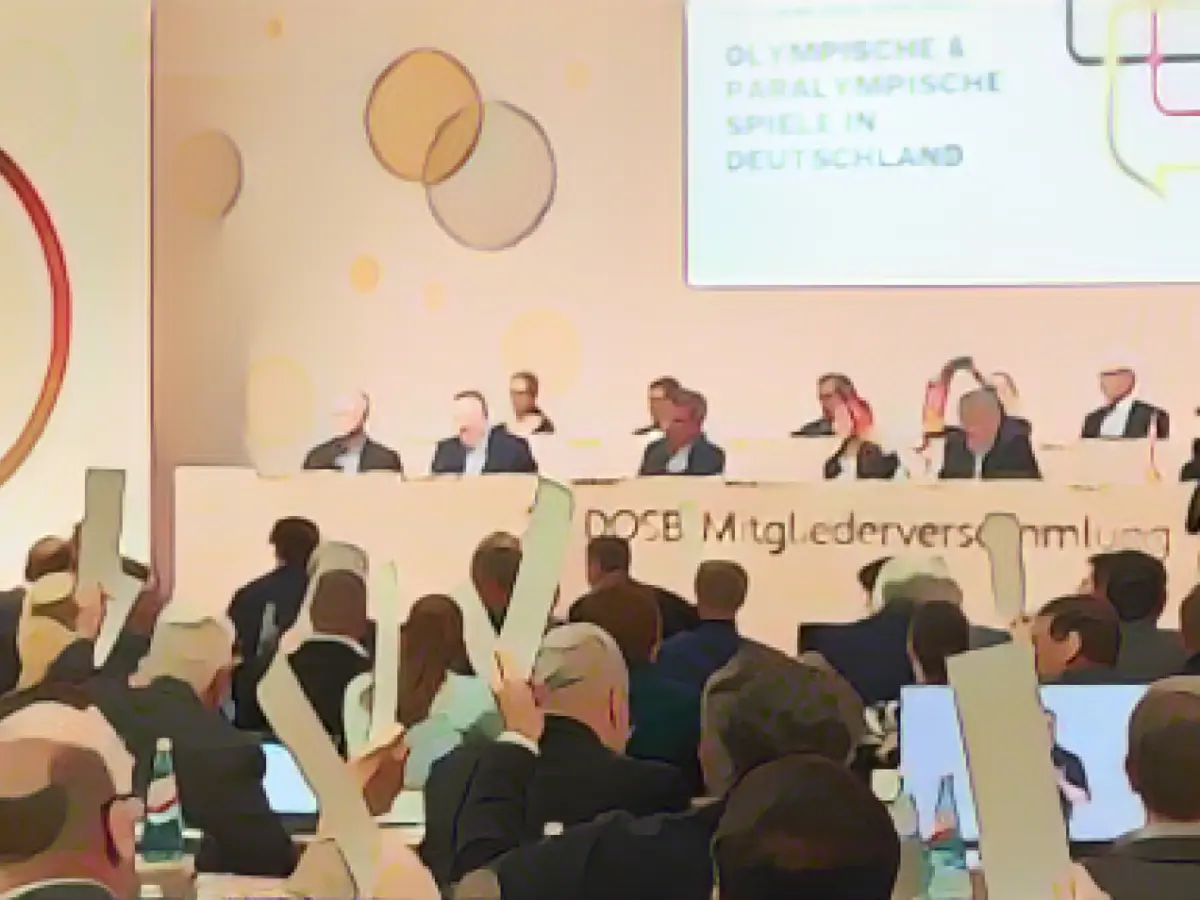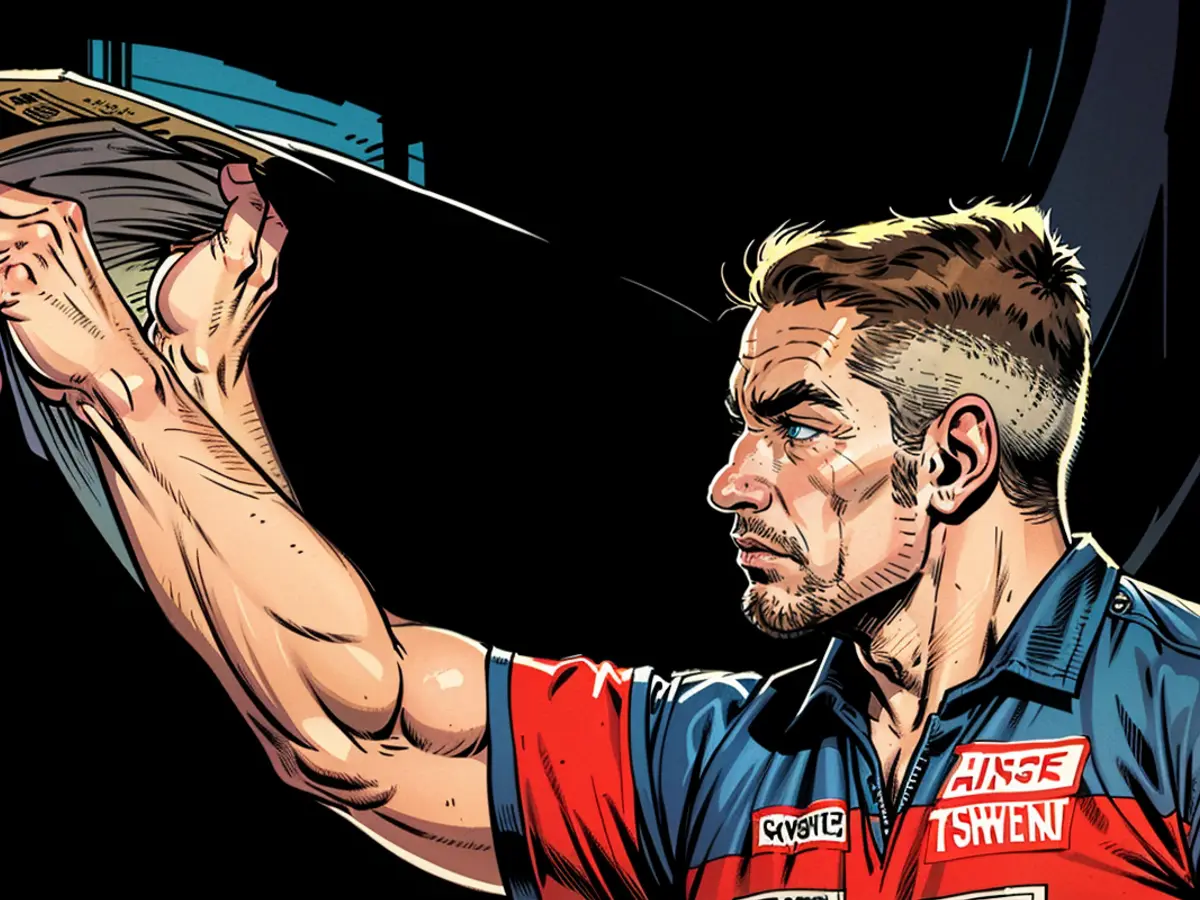Sports policy - "Don't pinch it": DOSB wants the Olympics and more appreciation
At the end of a long day, Thomas Weikert was able to score another goal - at the goal wall of the ZDF "Sportstudio". The invitation from the President of the German Olympic Sports Confederation had important reasons.
In nearby Frankfurt, the DOSB General Assembly had created a spirit of optimism with fundamental resolutions for an Olympic bid and the reform of elite sport. Critical words towards Berlin politicians were not shied away from, especially as Federal Minister of the Interior Nancy Faeser left many unanswered questions.
With a passionate speech, 62-year-old Weikert promoted the future projects and called for more appreciation for sport in general. "We want top success? So we have to create top conditions. This requires more money and more reliability," said the lawyer from Limburg. The federal government is expected to be a reliable partner in the implementation of the Olympic bid and reform and to keep its promises. Both projects are currently also affected by the budget freeze.
Final decision probably not for another year
Minister Faeser did not hear this criticism herself because she only arrived after Weikert's speech due to the winter weather. "The federal government wants a strong and credible bid and we will support the DOSB in this," said the SPD politician. The chosen path would be continued with the umbrella organization, the participating states and the cities of Berlin, Hamburg, Leipzig, Munich and the Rhine-Ruhr region. The federal government wanted to "give shape to a German bid" and use the power of the Olympic and Paralympic Games for the country and sport.
The fact that the federal government had not signed the official Memorandum of Understanding like the four cities and one region long ago was heavily criticized. "The federal government should lead the way and take the lead," warned Christoph Niessen, Chairman of the Board of the North Rhine-Westphalia State Sports Association. Regardless of this dispute, Weikert made it clear that the DOSB wants to be the spearhead. "We are tackling the Olympics and Paralympics in Germany. We will not back down," he emphasized. With the approval of the "Frankfurt Declaration", the DOSB was given the mandate to develop an Olympic concept. On this basis, suitable cities are to be selected in the summer and the bid for the 2036 or 2040 Summer Games decided in December 2024.
Federal government recently cut back on funding
A new survey has provided a tailwind, according to which a majority of German citizens are in favor of a bid. 58% of respondents in a survey conducted by opinion research institute YouGov on behalf of Deutsche Presse-Agentur are generally in favor of another attempt.
The German government also has high hopes for the reform of the governance and promotion of elite sport. "We want to bring German sport back to the top internationally. We want to bring more medals back to Germany," explained Faeser. She also failed to mention that only 200,000 instead of 600,000 euros have been approved for the expansion of the sports agency, the core of the reform, for 2024 and that there is a struggle for influence in the agency committees.
DOSB justifies vote for Russians and Belarusians to compete
On another topic, however, the DOSB came under pressure to justify itself. Shortly after the start of the Russian war of aggression against Ukraine, it was in favor of a strict exclusion of the country from competitions in world sport - including the Olympic Games. Now the DOSB has changed its mind and is in favor of Russians and Belarusians competing in Paris.
Is this due to the planned Olympic bid? "No, it's not," disagreed DOSB Chairman Torsten Burmester. They have had to acknowledge that majorities are changing and do not want to become "isolationist".
"If Germany were the only country to oppose Russians and Belarusians competing under a neutral flag, there would be no international sporting events in our country," Weikert emphasized, referring to a warning from the International Olympic Committee, and therefore demanded: "Don't ignore our concerns, accept the autonomy of sport."
Interior Minister Faeser had once announced that she would not issue visas to Russian athletes. Does this still apply? "For me, the Ukrainian athletes are the priority and it must always be ensured that they enjoy full protection," was her vague answer.
Read also:
- The discussions about Germany's Olympic bid and sports reform continued at a general meeting in Frankfurt, led by the DOSB President Thomas Weikert and Federal Minister of the Interior Nancy Faeser from Berlin.
- Despite the ongoing budget freeze, Weikert called for a reliable partnership from the federal government in implementing the Olympic bid and reform initiatives in Germany.
- The cities of Hamburg, Leipzig, Munich, and the Rhine-Ruhr region, along with the participating states, will collaborate with the DOSB and the federal government to shape a German bid for the 2036 or 2040 Summer Games.
- In a survey, a majority of German citizens expressed support for another attempt at an Olympic bid, with 58% favoring the idea.
- Nancy Faeser, the SPD politician, emphasized the German government's goal of bringing German sport to the international top level, aiming to earn more medals.
- Despite the approval for only 200,000 euros instead of 600,000 euros for the sports agency in 2024, Faeser firmly stated the intent to bring German sport back to the top.
- Following criticism of its stance on Russian athletes, the DOSB justified its decision to allow Russians and Belarusians to compete in Paris under a neutral flag, citing changing majority sentiments.
- Torsten Burmester, the DOSB Chairman, denied that the decision was influenced by the Olympic bid, emphasizing the necessity to avoid becoming 'isolationist'.
- Weikert highlighted the potential impact on international sports events in Germany if only German athletes were excluded, urging the acceptance of autonomy in sports.
- Faeser responded ambiguously to the query about issuing visas to Russian athletes, focusing on the protection of injured Ukrainian athletes as a priority.
Source: www.stern.de








